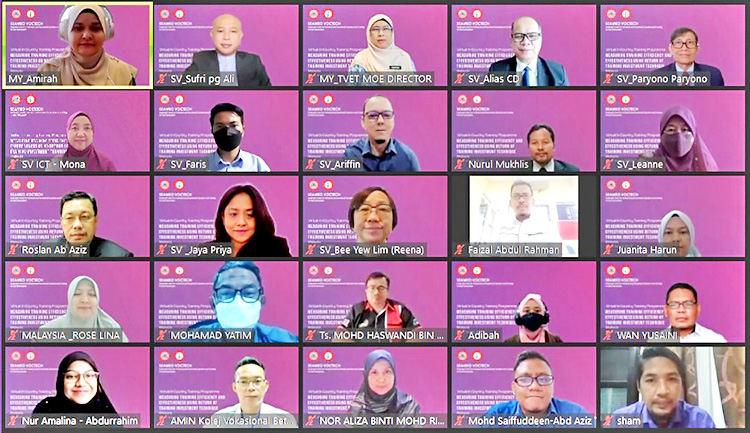Rokiah Mahmud
An in-country training programme on ‘Measuring Training Efficiency and Effectiveness Using Return on Training Investment Technique’ was officiated on March 7, drawing 28 participants from Malaysia.
Director of Technical and Vocational Education Training Division, Ministry of Education Malaysia and SEAMEO VOCTECH Governing Board Member, Malaysia Hajah Zanariah binti Haji Ahmad officiated the programme.
The programme was organised by the Technical and Vocational Education Training Division, Ministry of Education Malaysia in collaboration with SEAMEO VOCTECH Regional Centre, Brunei Darussalam.
SEAMEO VOCTECH Regional Centre Brunei Darussalam Centre Director Alias bin Haji Abu Bakar said despite the difficulties posed by COVID-19, the centre managed to offer in-country training programmes for Malaysia. “During this fiscal year of 2021/2022, the centre will offer 11 in-country training programmes instead of the maximum five, due to efficient conduct of online training. Thus, we have sufficient resources to reorganise in-country training programmes to SEAMEO member countries.
“The training is timely during the period when many are experiencing financial difficulties, thus prioritising interventions is needed. When resources are limited, we need to strategically select programmes offering higher impacts and show stakeholders we conducted a study to support the decision, or we have observed the impacts from previous and current interventions.
“At the regional level, SEAMEO Centres offer hundreds of training programmes per year. SEAMEO VOCTECH offers various training programmes annually, including at least five regional training programmes, 11 in-country training programmes and many customised training programmes,” he added.

“At the national level, countries spend on training programmes to improve the quality of education personnel.
“The training was planned to raise awareness and to equip participants with skills to carry out an impact study by incorporating return-on-investment methods.”
Meanwhile, Hajah Zanariah said the COVID-19 pandemic, lockdowns and movement restrictions served as an inflection point in the field of education across the globe.
“With the uncertainty about when things will eventually get back to normal, we are challenged to continue our daily tasks, activities, programmes, work, and routine in a new norm.
“As we move towards IR 4.0, that is also embedded in virtual training or even teaching and learning; we must endeavour to ensure we are familiar with technical processes such as Internet of Things (IoT) and other technological advancements in networking.
“Hence, the training programme is the best platform for participants mostly involved in training management to enhance their knowledge and skills in terms of developing training objectives by looking at the cost and investment of a training and calculating the return on training investment (ROTI) across all TVET institutions,” she added.
To intensify the quality of TVET graduates, curricula should be aligned with the industries. Thus, the involvement of the industry in the development of curricula and research activities is essential, she said.


